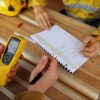Why drug test at work?

The costs associated with drug and alcohol use in the workplace are far-reaching. Drugs and alcohol not only make a workplace unsafe, but they also threaten a company's bottom line. A solid drug screening program ensures a safe work environment and protects the rights and workplace expectations of everyone involved.





